副词的比较级和最高级
- 格式:doc
- 大小:28.50 KB
- 文档页数:3
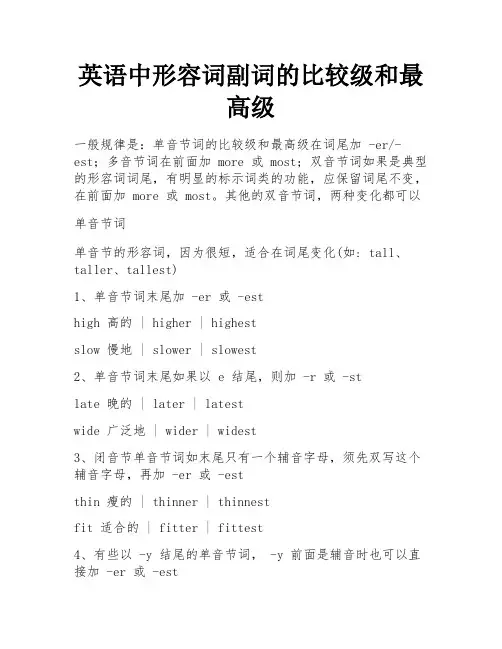
英语中形容词副词的比较级和最高级一般规律是:单音节词的比较级和最高级在词尾加 -er/-est;多音节词在前面加 more 或 most;双音节词如果是典型的形容词词尾,有明显的标示词类的功能,应保留词尾不变,在前面加 more 或 most。
其他的双音节词,两种变化都可以单音节词单音节的形容词,因为很短,适合在词尾变化(如: tall、taller、tallest)1、单音节词末尾加 -er 或 -esthigh 高的 | higher | highestslow 慢地 | slower | slowest2、单音节词末尾如果以 e 结尾,则加 -r 或 -stlate 晚的 | later | latestwide 广泛地 | wider | widest3、闭音节单音节词如末尾只有一个辅音字母,须先双写这个辅音字母,再加 -er 或 -estthin 瘦的 | thinner | thinnestfit 适合的 | fitter | fittest4、有些以 -y 结尾的单音节词, -y 前面是辅音时也可以直接加 -er 或 -estshy 害羞的 | shyer | shyestsly 狡猾的 | slyer | slyestwry 讽刺的 | wryer | wryest多音节词三个音节以上的多音节词已经很长,不适合再加词尾变化,因而在前面加 more 或 most,表示更(最)...,或者加 less 或least ,表示更(最)不...interesting 有趣的 | more interesting | most interestingimportant 重要的 | less important | least importantcarefully 认真地 | more carefully | most carefully双音节词双音节形容词很尴尬:不长不短,怎么判断?1、词尾是典型的形容词词尾,有明显的标示词类的功能,应保留词尾不变,在前面加 more 或 mostcrowded more crowded most crowdedloving more loving most lovinghelpful more helpful most helpfulfamous more famous most famousactive more active most active2、其他的双音节形容词,如果不是典型的形容词字尾,变化则无限制,两种变化都可以often oftener(more often) oftenest(most often)shallow shallower(more shallow) shallowest(most shallow)3、如果是 -y 结尾,这个长母音因为发音上的要求,要先变成短母音的 i,再加字尾变化,如:happy happier happiestlucky luckier luckiest二、不规则形式good/well | better | bestbad/ill/badly | worse | worstmany/much | more | mostlittle | less | leastfar | farther/further | farthest/furthestold | older/elder | oldest/eldest三、比较等级英语中形容词副词有三个比较等级,即原级、比较级和最高级1、原级(1) 表示程度相同,即“和...一样...”时用原级,常用"as... as" 结构It is as beautiful as paradise in Heaven. 这里如天堂般美丽This room is as broad as it is long. 那个房间长宽相等He is as handsome as John (is). 他和约翰一样英俊He studies as hard as John (does). 他和约翰一样努力(2) as...as... 引导的结构可采用倒装句型He studies as hard as John (does). = He studies as hard as does John.He is as handsome as John is. = He is as handsome as is John.(3) 否定的原级用 not as...as 或not so...as,二者区别不大You are not as tall as he. 你没有他高Guangzhou is not as clean as Shanghai. 广州没有上海那么干净I didn't do so well as I should. 我做得不如我应做得那么好(4) as/so... as... 结构前可以用 just、quite、almost、nearly、half 等词在程度上加以修饰This story was quite as interesting as we had thought. 这个故事和我们想的一样精彩The bike is not half so new as mine. 这辆自行车还没我的一半新She can read twice as fast as he does. 她的阅读速度比他快一倍John is not quite as good a student as his sister.连接词 as 表示这是组 as..as 的比较级。
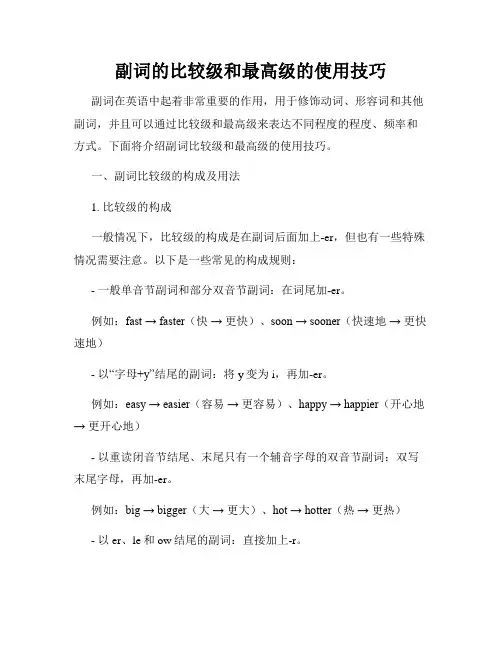
副词的比较级和最高级的使用技巧副词在英语中起着非常重要的作用,用于修饰动词、形容词和其他副词,并且可以通过比较级和最高级来表达不同程度的程度、频率和方式。
下面将介绍副词比较级和最高级的使用技巧。
一、副词比较级的构成及用法1. 比较级的构成一般情况下,比较级的构成是在副词后面加上-er,但也有一些特殊情况需要注意。
以下是一些常见的构成规则:- 一般单音节副词和部分双音节副词:在词尾加-er。
例如:fast → faster(快→ 更快)、soon → sooner(快速地→ 更快速地)- 以“字母+y”结尾的副词:将y变为i,再加-er。
例如:easy → easier(容易→ 更容易)、happy → happier(开心地→ 更开心地)- 以重读闭音节结尾、末尾只有一个辅音字母的双音节副词:双写末尾字母,再加-er。
例如:big → bigger(大→ 更大)、hot → hotter(热→ 更热)- 以er、le和ow结尾的副词:直接加上-r。
例如:clear → clearer(清晰地→ 更清晰地)、low → lower(低地→ 更低地)2. 比较级的用法比较级用于两个事物之间的比较,表示一者超过或不及另一者。
常用的表达方式有:- 表示肯定意义的比较级:副词+比较级+than。
例如:She runs faster than her brother.(她跑得比她哥哥快。
)- 表示否定意义的比较级:副词+less+than。
例如:He is less intelligent than his classmates.(他没有他的同学聪明。
)- 比较级前加上the表示最高点或极限。
例如:It's the most beautiful sunset I've ever seen.(那是我见过的最美的日落。
)二、副词最高级的构成及用法1. 最高级的构成最高级的构成一般在副词前面加上the,再在副词后面加上-est。


副词的比较级和最高级形式
1.单音节副词和部分双音节副词:
比较级:在词尾加上-er,例如:quickly(快速地)- more quickly (更快地)
最高级:在词尾加上-est,例如:quickly(快速地)- most quickly(最快地)
2.双音节和多音节副词:
比较级:在前面加上more,例如:carefully(小心地)- more carefully(更小心地)
最高级:在前面加上most,例如:carefully(小心地)- most carefully(最小心地)
3.不规则变化的副词:
- good(好地)- better(更好地)- best(最好地)
- well(好地)- better(更好地)- best(最好地)
- bad(坏地)- worse(更坏地)- worst(最坏地)
需要注意的是,并非所有的副词都具有比较级和最高级形式。
有些副词在比较级和最高级形式上保持不变,例如:often(经常地)、already (已经)、never(从未)等。
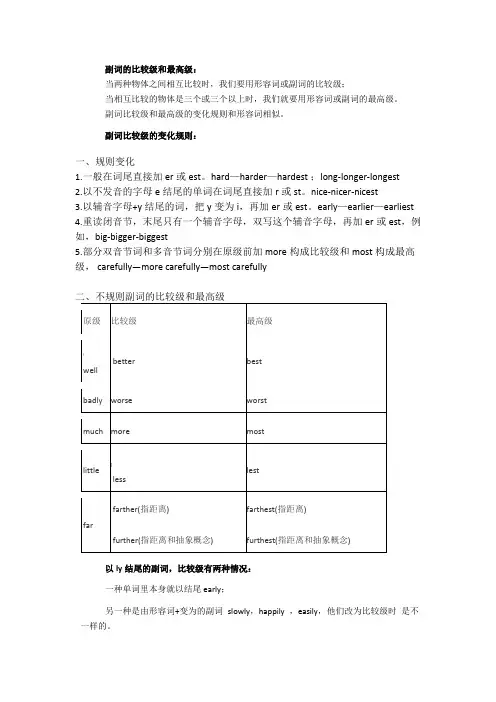
副词的比较级和最高级:当两种物体之间相互比较时,我们要用形容词或副词的比较级;当相互比较的物体是三个或三个以上时,我们就要用形容词或副词的最高级。
副词比较级和最高级的变化规则和形容词相似。
副词比较级的变化规则:一、规则变化1.一般在词尾直接加er或est。
hard—harder—hardest ;long-longer-longest2.以不发音的字母e结尾的单词在词尾直接加r或st。
nice-nicer-nicest3.以辅音字母+y结尾的词,把y变为i,再加er或est。
early—earlier—earliest4.重读闭音节,末尾只有一个辅音字母,双写这个辅音字母,再加er或est,例如,big-bigger-biggest5.部分双音节词和多音节词分别在原级前加more构成比较级和most构成最高级, carefully—more carefully—most carefully二、不规则副词的比较级和最高级原级比较级最高级(better bestwellbadly worse worstmuch more mostlestlittle[lessfarther(指距离)farthest(指距离)farfurther(指距离和抽象概念)furthest(指距离和抽象概念)以ly结尾的副词,比较级有两种情况:一种单词里本身就以结尾early;另一种是由形容词+变为的副词slowly,happily ,easily,他们改为比较级时是不一样的。
例如:第一种情况,直接进行词尾变化early-earlier;而第二种情况,就要在副词原级前面+more,构成比较级。
因此,easily 的比较级应该是:more easily 。
副词等级的用法:一、原级的用法1.只能修饰原级的词,very,quite,so,too。
例如:He is too tired to walk on.他太累了以至于不能再继续走了。
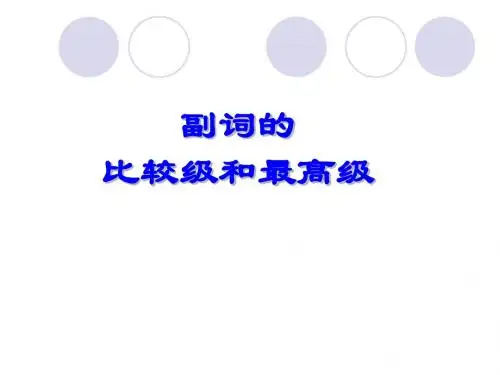
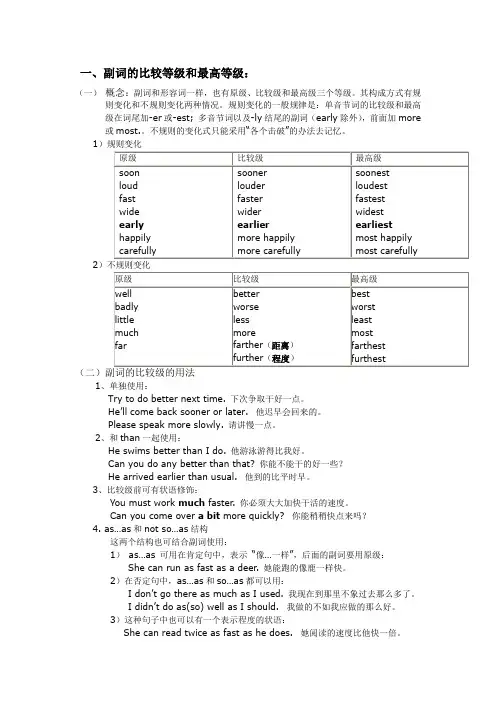
一、副词的比较等级和最高等级:(一)概念:副词和形容词一样,也有原级、比较级和最高级三个等级。
其构成方式有规则变化和不规则变化两种情况。
规则变化的一般规律是:单音节词的比较级和最高级在词尾加-er或-est; 多音节词以及-ly结尾的副词(early除外),前面加more 或most.。
不规则的变化式只能采用“各个击破”的办法去记忆。
121、单独使用:Try to do better next time. 下次争取干好一点。
He’ll come back sooner or later.他迟早会回来的。
Please speak more slowly. 请讲慢一点。
2、和than一起使用:He swims better than I do. 他游泳游得比我好。
Can you do any better than that? 你能不能干的好一些?He arrived earlier than usual. 他到的比平时早。
3、比较级前可有状语修饰:You must work much faster. 你必须大大加快干活的速度。
Can you come over a bit more quickly? 你能稍稍快点来吗?4. as…as和not so…as结构这两个结构也可结合副词使用:1)as…as 可用在肯定句中,表示“像…一样”,后面的副词要用原级:She can run as fast as a deer. 她能跑的像鹿一样快。
2)在否定句中,as…as和so…as都可以用:I don’t go there as much as I used. 我现在到那里不象过去那么多了。
I didn’t do as(so) well as I should.我做的不如我应做的那么好。
3)这种句子中也可以有一个表示程度的状语:She can read twice as fast as he does. 她阅读的速度比他快一倍。
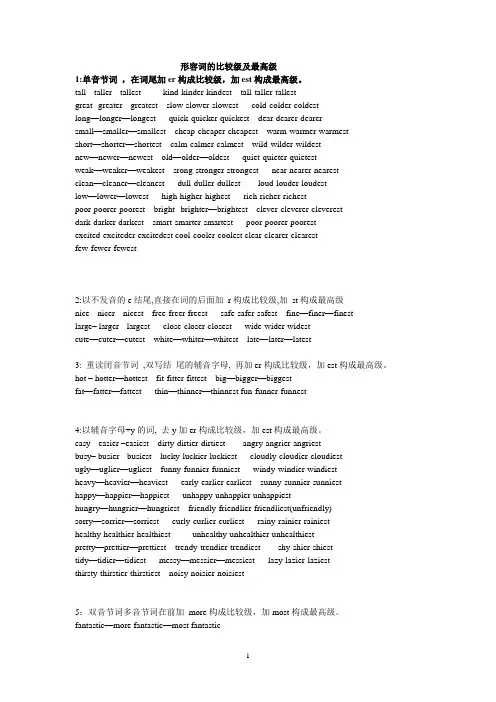
形容词的比较级及最高级1:单音节词,在词尾加er构成比较级,加est构成最高级。
tall-- taller --tallest kind-kinder-kindest tall-taller-tallestgreat--greater --greatest slow-slower-slowest cold-colder-coldest long—longer—longest quick-quicker-quickest dear-dearer-dearer small—smaller—smallest cheap-cheaper-cheapest warm-warmer-warmest short—shorter—shortest calm-calmer-calmest wild-wilder-wildest new—newer—newest old—older—oldest quiet-quieter-quietest weak—weaker—weakest srong-stronger-strongest near-nearer-nearest clean—cleaner—cleanest dull-duller-dullest loud-louder-loudest low—lower—lowest high-higher-highest rich-richer-richestpoor-poorer-poorest bright--brighter—brightest clever-cleverer-cleverestdark-darker-darkest smart-smarter-smartest poor-poorer-poorestexcited-exciteder-excitedest cool-cooler-coolest clear-clearer-clearestfew-fewer-fewest2:以不发音的e结尾,直接在词的后面加r构成比较级,加st构成最高级nice-- nicer --nicest free-freer-freest safe-safer-safest fine—finer—finestlarge– larger-- largest close-closer-closest wide-wider-widest cute—cuter—cutest white—whiter—whitest late—later—latest3: 重读闭音节词,双写结尾的辅音字母, 再加er构成比较级,加est构成最高级。
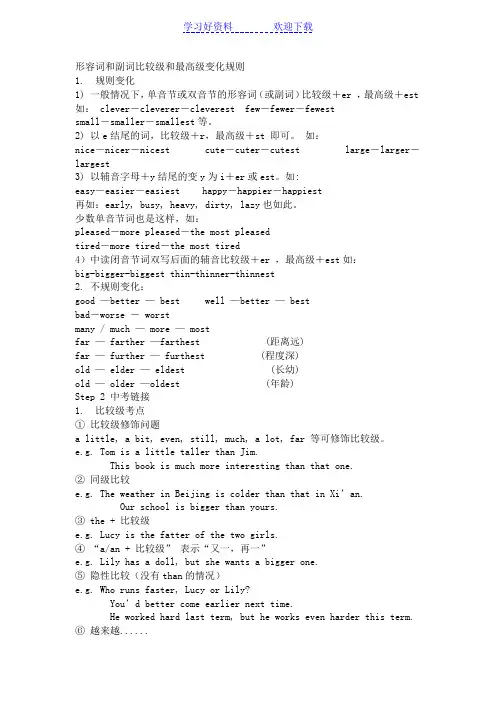
形容词和副词比较级和最高级变化规则1. 规则变化1) 一般情况下,单音节或双音节的形容词(或副词)比较级+er ,最高级+est 如: clever-cleverer-cleverest few-fewer-fewestsmall-smaller-smallest等。
2) 以e结尾的词,比较级+r,最高级+st 即可。
如:nice-nicer-nicest cute-cuter-cutest large-larger-largest3) 以辅音字母+y结尾的变y为i+er或est。
如:easy-easier-easiest happy-happier-happiest再如:early, busy, heavy, dirty, lazy也如此。
少数单音节词也是这样,如:pleased-more pleased-the most pleasedtired-more tired-the most tired4)中读闭音节词双写后面的辅音比较级+er ,最高级+est如:big-bigger-biggest thin-thinner-thinnest2. 不规则变化:good —better — best well —better — bestbad-worse - worstmany / much — more — mostfar — farther —farthest (距离远)far — further — furthest (程度深)old — elder — eldest (长幼)old — older —oldest (年龄)Step 2 中考链接1. 比较级考点①比较级修饰问题a little, a bit, even, still, much, a lot, far 等可修饰比较级。
e.g. Tom is a little taller than Jim.This book is much more interesting than that one.②同级比较e.g. The weather in Beijing is colder than that in Xi’an.Our school is bigger than yours.③ the + 比较级e.g. Lucy is the fatter of the two girls.④“a/an + 比较级” 表示“又一,再一”e.g. Lily has a doll, but she wants a bigger one.⑤隐性比较(没有than的情况)e.g. Who runs faster, Lucy or Lily?You’d better come earlier next time.He worked hard last term, but he works even harder this term.⑥越来越......a. 比较级 + and + 比较级b. the + 比较级 + 句子,the + 比较级 + 句子a. e.g. It’s getting colder and colder.The more you exercise, the better you are.2. 最高级考点说明:形容词的最高级前必须加the; 副词的最高级前省略the。
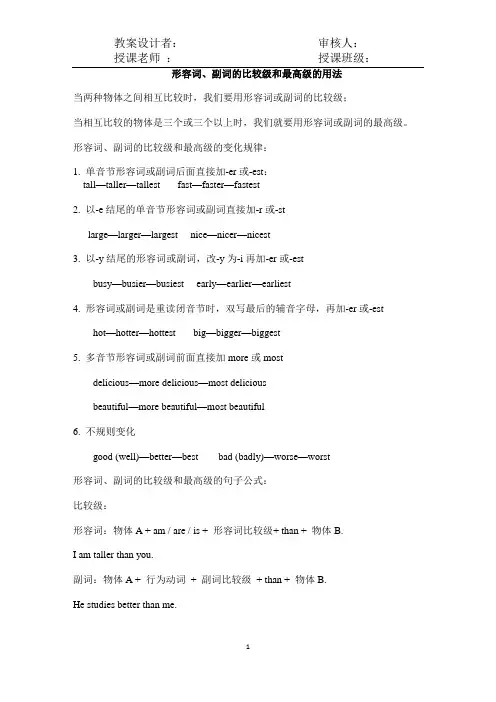
教案设计者:审核人:授课老师:授课班级:形容词、副词的比较级和最高级的用法当两种物体之间相互比较时,我们要用形容词或副词的比较级;当相互比较的物体是三个或三个以上时,我们就要用形容词或副词的最高级。
形容词、副词的比较级和最高级的变化规律:1. 单音节形容词或副词后面直接加-er或-est:tall—taller—tallest fast—faster—fastest2. 以-e结尾的单音节形容词或副词直接加-r或-stlarge—larger—largest nice—nicer—nicest3. 以-y结尾的形容词或副词,改-y为-i再加-er或-estbusy—busier—busiest early—earlier—earliest4. 形容词或副词是重读闭音节时,双写最后的辅音字母,再加-er或-esthot—hotter—hottest big—bigger—biggest5. 多音节形容词或副词前面直接加more或mostdelicious—more delicious—most deliciousbeautiful—more beautiful—most beautiful6. 不规则变化good (well)—better—best bad (badly)—worse—worst形容词、副词的比较级和最高级的句子公式:比较级:形容词:物体A + am / are / is + 形容词比较级+ than + 物体B.I am taller than you.副词:物体A + 行为动词+ 副词比较级+ than + 物体B.He studies better than me.1八年级下册教学案例设计最高级:1)物体A + am / are / is + the + 形容词最高级+ 比较范围(of + 人/物,in +地方).I am the tallest in the class.Pasta is the most delicious food of the three.2)物体A + 行为动词+ 副词最高级+ 比较范围(of + 人/物,in + 地方).Cheetahs run fastest in the world.He studies best of us.一. 词形变换。
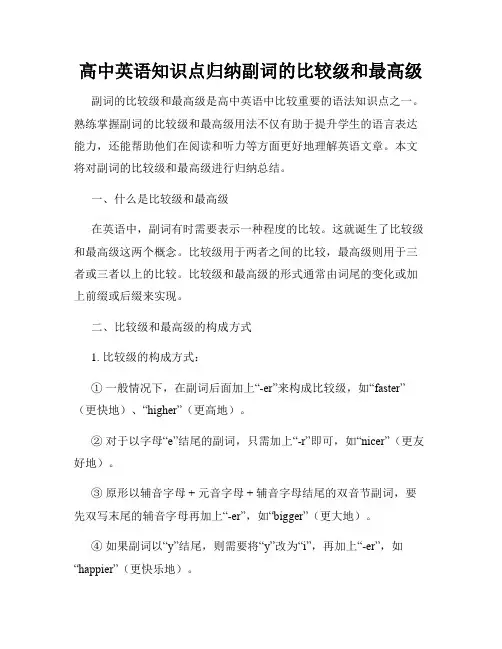
高中英语知识点归纳副词的比较级和最高级副词的比较级和最高级是高中英语中比较重要的语法知识点之一。
熟练掌握副词的比较级和最高级用法不仅有助于提升学生的语言表达能力,还能帮助他们在阅读和听力等方面更好地理解英语文章。
本文将对副词的比较级和最高级进行归纳总结。
一、什么是比较级和最高级在英语中,副词有时需要表示一种程度的比较。
这就诞生了比较级和最高级这两个概念。
比较级用于两者之间的比较,最高级则用于三者或三者以上的比较。
比较级和最高级的形式通常由词尾的变化或加上前缀或后缀来实现。
二、比较级和最高级的构成方式1. 比较级的构成方式:①一般情况下,在副词后面加上“-er”来构成比较级,如“faster”(更快地)、“higher”(更高地)。
②对于以字母“e”结尾的副词,只需加上“-r”即可,如“nicer”(更友好地)。
③原形以辅音字母 + 元音字母 + 辅音字母结尾的双音节副词,要先双写末尾的辅音字母再加上“-er”,如“bigger”(更大地)。
④如果副词以“y”结尾,则需要将“y”改为“i”,再加上“-er”,如“happier”(更快乐地)。
2. 最高级的构成方式:①一般情况下,在比较级前加上“the”再加上“-est”来构成最高级,如“the fastest”(最快的)、“the highest”(最高的)。
②对于以“e”结尾的副词,只需加上“-st”即可,如“the nicest”(最友好的)。
③原形以辅音字母 + 元音字母 + 辅音字母结尾的双音节副词,要先双写末尾的辅音字母再加上“-est”,如“the biggest”(最大的)。
④如果副词以“y”结尾,则需要将“y”改为“i”,再加上“-est”,如“the happiest”(最快乐的)。
三、比较级和最高级的用法1. 比较级的用法:①表示两者之间的比较时,前面的一般是“than”结构,在后面加上比较级,如“She runs faster than him.”(她跑得比他快)。
一、形容词、副词的比较级和最高级的构成规则1.一般单音节词和少数以-er-ow结尾的双音节词,比较级在后面加-er,最高级在后面加-est单音节词如:small→smaller→smallest short→shorter→shortesttall→taller→tallest great→greater→greatest2)双音节词如:clever→cleverer→cleverest narrow→narrower→narrowest以不发音e结尾的单音节词,比较在原级后加-r,最高级在原级后加-st;如:large→larger→largestnice→nicer→nicestable→abler→ablest3.在重读闭音节(即:辅音+元音+辅音)中,先双写末尾的辅音字母,比较级加-er,最高级加-est;如:big→bigger→biggesthot→hotter→hottestfat→fatter→fattest4.以“辅音字母+y”结尾的双音节词,把y改为i,比较级加-er,最高级加-est;如:easy→easier→easiest heavy→heavier→heaviestbusy→busier→busiest happy→happier→happiest5.其他双音节词和多音节词,比较级在前面加more,最高级在前面加most;如:beautiful→more beautiful→most beautifuldifferent→more different→most differenteasily→more easily→most easily3 我们的学校变得越来越美丽3.在含有or的选择疑问句中,如果有两者供选择,前面的形容词要用比较级形式。
如:Who is taller,Tim or Tom? 谁更高,Tim还是Tom?4. “the +比较级……, the+比较级”,表示“越……越……”。
形容词副词比较级最高级变化规则及用法形容词的比较级和最高级的变化规则如下:1. 一般情况下,在形容词的原级后加-er作为比较级,加-est作为最高级。
例如:原级:tall(高)比较级:taller(更高)最高级:tallest(最高)2. 以字母“e”结尾的形容词,在原级后只加-r作为比较级,加-st作为最高级。
例如:原级:large(大的)比较级:larger(更大的)最高级:largest(最大的)3. 以元音字母加辅音字母结尾的单音节形容词,在原级后双写最后一个辅音字母,再加-er作为比较级,加-est作为最高级。
例如:原级:hot(热的)比较级:hotter(更热的)最高级:hottest(最热的)4. 以辅音字母加-y结尾的形容词,在原级中把-y改为-i,再加-er作为比较级,加-est作为最高级。
例如:原级:funny(有趣的)比较级:funnier(更有趣的)最高级:funniest(最有趣的)副词的比较级和最高级的变化规则如下:1. 大多数副词在前面加more形成比较级,在前面加most形成最高级。
例如:原级:quickly(快速地)比较级:more quickly(更快速地)最高级:most quickly(最快速地)2. 以字母“e”结尾的副词,在前面只加-r形成比较级,加-st形成最高级。
例如:原级:late(迟)比较级:later(更迟)最高级:latest(最迟)3. 以字母“y”结尾的副词,在前面把-y改为-i,再加-er形成比较级,加-est形成最高级。
例如:原级:busy(忙碌地)比较级:busier(更忙碌地)最高级:busiest(最忙碌地)需要注意的是,有些形容词和副词的比较级和最高级形式并不遵循以上的规则,而是需要记忆。
例如:good(好的)- better(更好的)- best(最好的), well(好地)- better(更好地)- best(最好地)。
副词的比较级和最高级:高副词是用来修饰动词、形容词、其他副词或整个句子的词语。
在英语中,副词可以有比较级和最高级形式,用来表达一种比较或最高程度的意义。
本文将介绍副词比较级和最高级的用法。
比较级用于比较两者之间的差别或程度,常用于表示较高或较低的程度。
通常的规则是:- 一般情况下,在副词前面加more表示比较级。
例如:more quickly(更快地)、more slowly(更慢地)。
- 以-ly结尾的副词,可以直接在后面加er表示比较级。
例如:quicker(更快地)、slower(更慢地)。
2. 最高级(Superlative Degree)最高级用于表示三者或三者以上的比较,常用于表示最高程度。
通常的规则是:- 一般情况下,在副词前面加the most表示最高级。
例如:the most quickly(最快地)、the most slowly(最慢地)。
- 以-ly结尾的副词,可以在后面加est表示最高级。
例如:quickest(最快地)、slowest(最慢地)。
需要注意的是,有一些副词的比较级和最高级是不规则的,需要记住其变化形式。
例如:- good(好的):better(更好的)、best(最好的)- bad(坏的):worse(更坏的)、worst(最坏的)- little(少的):less(更少的)、least(最少的)总之,副词的比较级和最高级可以帮助我们表达不同程度的含义,根据规则来加前缀或后缀即可。
在写作中,正确使用这些形式可以使句子更加生动有力,准确传递信息。
参考资料:- The Elements of Style, Fourth Edition by William Strunk Jr. and E.B. White- English Grammar in Use by Raymond Murphy。
little:形容词比较级littler/less/lesser 形容词最高级littlest/least 副词比较级less 副词最高级least far:形容词比较级farther/further 形容词最高级farthest/furthest 副词比较级farther/further 副词最高级farthest/furthest well:形容词比较级better 形容词最高级best 副词比较级better 副词最高级best ill:形容词比较级worse 形容词最高级worst 副词比较级worse 副词最高级worst many:形容词比较级more 形容词最高级most bad:形容词比较级worse 形容词最高级worst good:形容词比较级better 形容词最高级:best old:形容词比较级:older/elder 形容词最高级:oldest/eldest good:比较级better 最高级the best hot:比较级hotter 最高级the hottest heavy:比较级heavier 最高级the heaviest fine:比较级finer 最高级the finest exciting:比较级more exciting 最高级the most exciting bad:比较级worse 最高级the worst creative:比较级more creative 最高级the most creative boring:比较级more boring 最高级the most boring far:比较级farther/further 最高级the farthest/the furthest near:比较级nearer 最高级the nearest 最高级。
副词的比较级和最高级
副词比较级和最高级的变化形式与形容词基本上一样
一般副词
hard→harder→hardest
fast→faster→fastest
late→later→latest
early→earlier→earliest
特殊副词
well →better→best
much →more→most
badly →worse→worst
little →less→least但是,开放类副词即以后缀ly结尾的副词不能像形容词那样加er 或est,如
quickly →more quickly →most quickly quietly →more quietly →most quietl y
〔注〕:early中的ly不是后缀,故可以把y变i再加er和est
兼有两种形式的副词
1) close与closely
close意思是"近";closely 意思是"仔细地"
He is sitting close to me.
Watch him closely.
2) late 与lately
late意思是"晚";lately 意思是"最近"
You have come too late.
What have you been doing lately?
3) deep与deeply
deep意思是"深",表示空间深度;deeply时常表示感情上的深度,"深深地"
He pushed the stick deep into the mud.
Even father was deeply moved by the film.
4) high与highly
high表示空间高度;highly表示程度,相当于much
The plane was flying high.
I think highly of your opinion.
5) wide与widely
wide表示空间宽度;widely意思是"广泛地","在许多地方"
He opened the door wide.
English is widely used in the world.
6) free与freely
free的意思是"免费";freely 的意思是"无限制地"
You can eat free in my restaurant whenever you like.
You may speak freely; say what you like.
1. 副词的比较级和最高级的构成
副词和形容词一样,也有原级、比较级和最高级三个等级。
其构成方式有规则变化和
不规则变化两种情况。
规则变化的一般规律是:单音节词的比较级和最高级在词尾加-er 或
-est; 多音节词以及-ly结尾的副词(early除外),前面须加more 或most. 不规则的变化式
只能采用“各个击破”的办法去记忆。
1)规则变化
原级soon long loud fast wide early happily carefully
比较级sooner longer louder faster wider earlier more happily more carefully
最高级soonest longest loudest fastest widest earliest most happily most carefully
2)不规则变化
原级well badly little much far
比较级better worse less more farther further
最高级best worst least most farthest furthes
3副词的比较级的用法
1)单独使用:
Try to do better next time. 下次争取干好一点。
I had seen the film only a few days earlier. 我是几天前才看的这部电影。
He’ll come back sooner or later.他迟早会回来的。
Please speak more slowly. 请讲慢一点。
I determined not to travel farther that night. 我决定那天晚上不再往前走了。
2)和than一起使用:
He swims better than I do. 他游泳游得比我好。
He works less than he used to. 他工作的时间比以前少了。
Can you do any better than that? 你能不能干的好一些?
He arrived earlier than usual. 他到的比平时早。
He studied the subject further than I do. 这问题他研究得比我深。
3)比较级前可有状语修饰:
You must work much faster. 你必须大大加快干活的速度。
He walked no further. 他没在往前走。
She could dance even more gracefully than a dancer. 她能比舞蹈演员跳的更美。
Helen came late, but her sister came still later. 海伦来晚了,而她妹妹来得更晚。
Can you come over a bit more quickly? 你能稍稍快点来吗?
4. as…as和not so…as结构
这两个结构也可结合副词使用:
1)as…as 可用在肯定句中,表示“像…一样”,后面的副词要用原级:
She can run as fast as a deer. 她能跑的像鹿一样快。
They work as hard as you do. 他们工作像你一样努力。
I hate him as much as you do. 我像你一样恨他。
I’ll be round as quick as I can. 我将尽快过来。
2)在否定句中,as…as和so…as都可以用:
I don’t go there as much as I used. 我现在到那里不象过去那么多了。
I didn’t do as(so) well as I should.我做的不如我应做的那么好。
I can’t jump so(as)loudly as Bill.我跳高不如比尔。
I don’t like it so (as) your other works.我喜欢它不及你的其他作品。
3)这种句子中也可以有一个表示程度的状语:
I don’t speak half as (so) well as you.我讲的不及你的一半好。
She can read twice as fast as he does. 她阅读的速度比他快一倍。
The substance reacts three times as fast as the other one. 这种物质的反应速度是另一种物质的三倍。